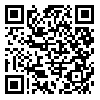Volume 3, Issue 4 (12-2019)
EBHPME 2019, 3(4): 293-302 |
Back to browse issues page
Download citation:
BibTeX | RIS | EndNote | Medlars | ProCite | Reference Manager | RefWorks
Send citation to:



BibTeX | RIS | EndNote | Medlars | ProCite | Reference Manager | RefWorks
Send citation to:
Rostami A, Keshmiri F, Askari R, Jambarsang S, Shafiei M. Validation of Groningen Reflection Ability Scale Questionnaire and Evaluation of Reflection Ability Level of Health Care Management Students. EBHPME 2019; 3 (4) :293-302
URL: http://jebhpme.ssu.ac.ir/article-1-256-en.html
URL: http://jebhpme.ssu.ac.ir/article-1-256-en.html
Health Policy and Management Research Center, Department of Health Services Management, School of Public Health, Shahid Sadoughi University of Medical Sciences , Yazd , Iran , milad.shafii@gmail.com
Abstract: (3593 Views)
Background: Reflection has been extensively used in different areas for better thinking about previous experiences and reaching to new behaviors, which leads to an improvement in personal skills and knowledge. Reflection ability is one of the most essential competencies for healthcare professionals and medical students, which is emphasized in several medical courses and references. This ability is improved with practice and repetition. Therefore, reflection in medical education is very important. Thus the aim of the present study was evaluation of reliability and validity of the tool for assessing this skill and determination of reflection ability level of health care management students.
Methods: The present descriptive and cross-sectional research, performed in two phases. The study population were 30 students of health care management. In the first phase, after the translation of the questionnaire, the reliability and validity of the questionnaire was determined. In the second phase and for evaluation of reflection ability level in health care management students, the Groningen Reflection Ability Scale questionnaire was completed by students and data analyzed with independent t-test and Pearson correlation statistical tests.
Results: The reliability and validity of the questionnaire were confirmed (Cronbach's alpha = 0.73). The reflection ability score of students was 82.13 ± 4.24. After a statistical analysis of data among genders, although the reflection scores of males (83.58 ± 4.37) were higher than females (81.17 ± 3.97), but this difference was not statistically significant (P-value ≥ 0.05). Also, the difference between demographic variables and reflection ability scores was not statistically significant (P-value ≥ 0.05).
Conclusion: This study showed that the GRAS questionnaire is a useful tool for assessing the reflection ability and students have medium scores of reflection ability so educational managers should pay serious attention in planning related fields.
Methods: The present descriptive and cross-sectional research, performed in two phases. The study population were 30 students of health care management. In the first phase, after the translation of the questionnaire, the reliability and validity of the questionnaire was determined. In the second phase and for evaluation of reflection ability level in health care management students, the Groningen Reflection Ability Scale questionnaire was completed by students and data analyzed with independent t-test and Pearson correlation statistical tests.
Results: The reliability and validity of the questionnaire were confirmed (Cronbach's alpha = 0.73). The reflection ability score of students was 82.13 ± 4.24. After a statistical analysis of data among genders, although the reflection scores of males (83.58 ± 4.37) were higher than females (81.17 ± 3.97), but this difference was not statistically significant (P-value ≥ 0.05). Also, the difference between demographic variables and reflection ability scores was not statistically significant (P-value ≥ 0.05).
Conclusion: This study showed that the GRAS questionnaire is a useful tool for assessing the reflection ability and students have medium scores of reflection ability so educational managers should pay serious attention in planning related fields.
Type of Study: Original article |
Subject:
Healt care Management
Received: 2019/09/5 | Accepted: 2020/09/22 | Published: 2019/12/19
Received: 2019/09/5 | Accepted: 2020/09/22 | Published: 2019/12/19
Send email to the article author
| Rights and permissions | |
 |
This work is licensed under a Creative Commons Attribution-NonCommercial 4.0 International License. |







